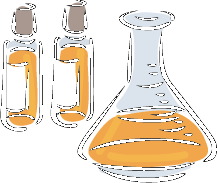|
home: www.rubythroat.org |
|
|
home: www.rubythroat.org |
|
 Some students involved with Operation RubyThroat may conduct investigative projects in Chemistry or Environmental Science.
Some students involved with Operation RubyThroat may conduct investigative projects in Chemistry or Environmental Science.
Under this section we list questions about hummingbirds that are worthy of investigation, but we do not outline entire projects; in other words, the questions are intended to stimulate inquiry by students and others. Operation RubyThroat stands ready to advise student researchers about project design on an individual basis. For help on setting up your specific hummingbird research project, contact PROJECTS.
NOTE: Teachers and their student groups, individual students, and others who are registered participants with Operation RubyThroat get priority attention to all requests for information and assistance. To register, see How to Participate.
-- Evaluate chemical & caloric content of nectar from flowers used--or NOT used--by Ruby-throated Hummingbirds. (NOTE: Sugar content can be tested with a simple refractometer, which some schools already have to test salinity. Comparisons could be made on sugar percentages in nectar in different species of flowers and in the same flower at different times of the day, or year.)
-- Determine whether the 4:1 water:sugar mix recommended for hummingbird feeders has a different sugar concentration if calculated by weight rather than volume, and whether the concentrations vary if you use sucrose, dextrose, or fructose.
-- Human drinking water comes from different sources, and sometimes we can tell the difference in taste. Determine whether hummingbirds seem to have a preference for water from particular sources (e.g., well water, treated water, bottled water, distilled water, etc.) by mixing up different batches of 4:1 water:sugar for their feeders.
-- Conduct field studies to determine if RTHU forage in areas in which herbicides and pesticides are used.
-- Although DDT is outlawed for use in the United States, it is still manufactured here and exported to other countries. Have students do library/Internet research to determine if DDT is exported to countries where Ruby-throated Hummingbirds overwinter in the tropics.
Up to Top of Page
|
Make direct donations on-line through
Network for Good: |
 |
|
LIKE TO SHOP ON-LINE?
Donate a portion of your purchase price from 500+ top on-line stores via iGive: |
|
|
Use your PayPal account
to make direct donations: |
|
|
|
Share Your Hummingbird Experiences Through "Hummingbird Hobnob" |
 |
Operation |
|
|